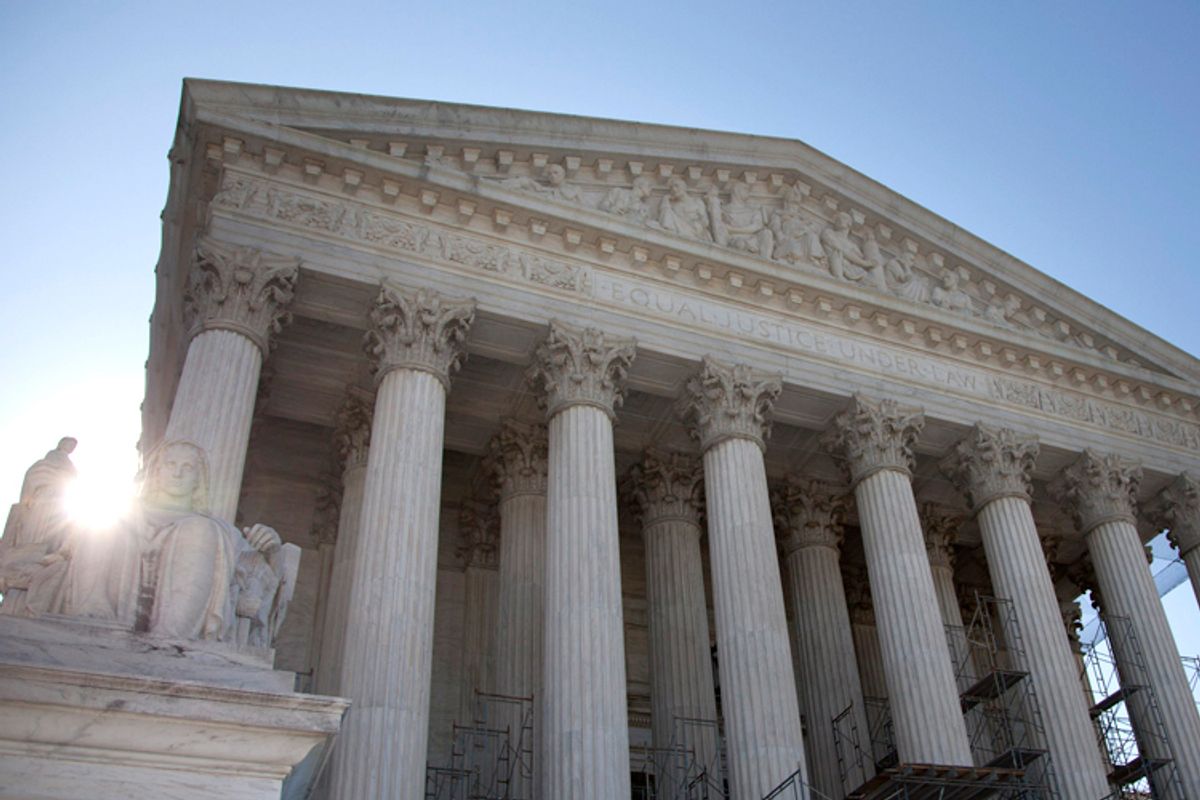WASHINGTON — DNA may be the building block of life, but can something taken from it also be the building block of a multimillion-dollar medical monopoly?
The Supreme Court grapples Monday with the question of whether human genes can be patented. Its ultimate answer could reshape U.S. medical research, the fight against diseases like breast and ovarian cancer and the multi-billion dollar medical and biotechnology business.
"The intellectual framework that comes out of the decision could have a significant impact on other patents - for antibiotics, vaccines, hormones, stem cells and diagnostics on infectious microbes that are found in nature," Robert Cook-Deegan, director for genome ethics, law & policy at Duke University, said in a statement.
"This could affect agricultural biotechnology, environmental biotechnology, green-tech, the use of organisms to produce alternative fuels and other applications," he said.
The nine justices' decision will also have a profound effect on American business, with billions of dollars of investment and years of research on the line. The U.S. Patent and Trademark Office has been awarding patents on human genes for almost 30 years.
And Myriad Genetics alone has $500 million invested in the patents being argued over in this case. Without the ability to recoup that investment, breakthrough scientific discoveries needed to combat all kind of medical maladies wouldn't happen, the company says.
"Countless companies and investors have risked billions of dollars to research and develop scientific advances under the promise of strong patent protection," said Peter D. Meldrum, the president and CEO of Myriad Genetics, in a statement.
But their opponents argue that allowing companies like Myriad to patent human genes or parts of human genes will slow down or cripple lifesaving medical research like in the battle against breast cancer.
"What that means is that no other researcher or doctor can develop an additional test, therapy or conduct research on these genes," said Karuna Jagger, executive director of Breast Cancer Action.
The Supreme Court has already said that abstract ideas, natural phenomena and laws of nature cannot be given a patent, which gives an inventor the right to prevent others from making, using or selling a novel device, process or application.
Myriad's case involves patents on two genes linked to increased risk of breast and ovarian cancer. Myriad's BRACAnalysis test looks for mutations on the breast cancer predisposition gene, or BRCA. Those mutations are associated with much greater risks of breast and ovarian cancer.
Women with a faulty gene have a three to seven times greater risk of developing breast cancer and a higher risk of ovarian cancer. Men can also carry a BRCA mutation, raising their risk of prostate, pancreatic and other types of cancer. The mutations are most common in people of eastern European Jewish descent.
Myriad sells the only BRCA gene test.
The American Civil Liberties Union challenged Myriad's patents, arguing that genes couldn't be patented, and in March 2010 a New York district court agreed. But the U.S. Court of Appeals for the Federal Circuit has now twice ruled that genes can be patented. In Myriad's case, it's because the isolated DNA has a "markedly different chemical structure" from DNA within the body.
Mark C. Capone, president of Myriad Genetics Laboratories, Inc., a subsidiary of Myriad, said some of the concerns over what they have patented are overblown and some simply incorrect.
"Myriad cannot, should not and has not patented genes as they exist in the human body on DNA," Capone said in an interview. "This case is truly about isolated DNA molecules which are synthetic chemicals created by the human ingenuity of man that have very important clinical utilities, which is why this was eligible for a patent."
But the ACLU is arguing that isolating the DNA molecules doesn't stop them from being DNA molecules, which they say aren't patentable.
"Under this theory, Hans Dehmelt, who won the Nobel Prize for being the first to isolate a single electron from an atom, could have patented the electron itself," said Christopher A. Hansen, the ACLU's lawyer in court papers. "A kidney removed from the body (or gold extracted from a stream) would be patentable subject matter."
The Obama administration seems to agree. Artificially created DNA can be patented, but "isolated but otherwise unmodified genomic DNA is not patent-eligible," Solicitor General Donald Verrilli said in court papers.
That was the ruling of the original judge who looked at Myriad's patents after they were challenged by the ACLU in 2009. U.S. District Judge Robert Sweet said he invalidated the patents because DNA's existence in an isolated form does not alter the fundamental quality of DNA as it exists in the body or the information it encodes. But the federal appeals court reversed him in 2011, saying Myriad's genes can be patented because the isolated DNA has a "markedly different chemical structure" from DNA within the body.
The Supreme Court threw out that decision and sent the case back to the lower courts for rehearing. This came after the high court unanimously threw out patents on a Prometheus Laboratories, Inc., test that could help doctors set drug doses for autoimmune diseases like Crohn's disease, saying the laws of nature are unpatentable.
But the federal circuit upheld Myriad's patents again in August, leading to the current review. The court will rule before the end of the summer.
"The key issue now for the court will therefore be whether the scientist working in the lab to isolate a particular gene innovated in a way that allows for that isolated gene to be patented," said Bruce Wexler, a lawyer with the law firm Paul Hastings, who advises pharmaceutical and biotech companies on patent issues.
The case is 12-398, Association for Molecular Pathology v. Myriad Genetics, Inc.



Shares